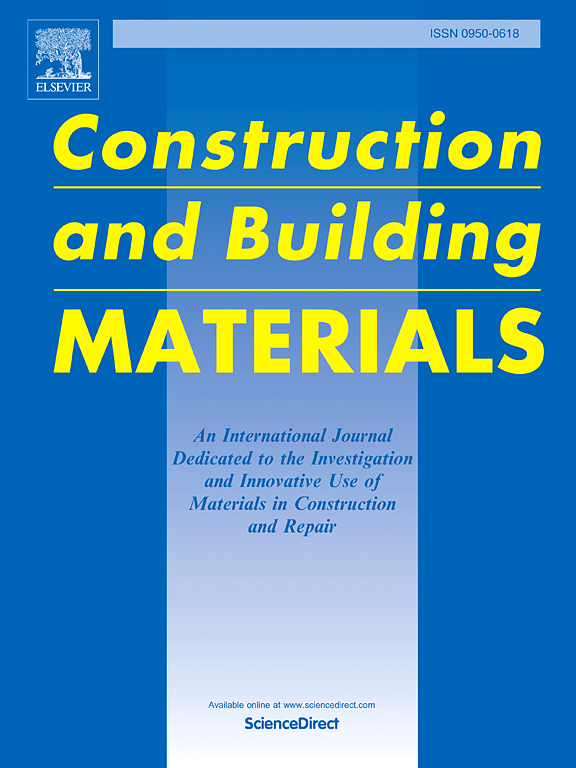Early age time-dependent mechanical properties of 3D-printed concrete with coarse aggregates
IF 7.4
1区 工程技术
Q1 CONSTRUCTION & BUILDING TECHNOLOGY
引用次数: 0
Abstract
Incorporating coarse aggregate into 3D-printed concrete is essential for promoting its practical application, yet the impact on the early age time-dependent mechanical properties, crucial for the multilayer structure stability and quality, is underexplored. In this study, 3D-printed concrete with coarse aggregate (3DPCA) with varying mortar-to-coarse aggregate ratios (M/A) and coarse aggregate gradations were prepared, of which uniaxial unconfined compression and direct shear performance were experimentally investigated. The fundamental formulations between the early age mechanical parameters and the resting time of 3DPCA were characterized and then utilized in a digital model simulating actual printing. Results indicated that the 3DPCA early age mechanical properties, including compressive strength, Young's modulus, cohesion, and friction angle, increased with longer resting time and decreasing M/A, and higher proportions of aggregates above 9.5 mm. High coarse aggregate content caused three distinct compressive strength-displacement curve stages and complicated strength eigenvalue extraction. Coarse aggregate gradation affected shear properties more than content, with larger aggregates improving cohesion and friction angles. The failure mode prediction model based on ABAQUS could accurately predict the maximum collapse layer of 3DPCA that occurred in overall unstable collapse and over-expansion failure but was incapable of localized deformation.
含粗骨料的 3D 打印混凝土的龄期力学性能与时间有关
在三维打印混凝土中加入粗骨料对促进其实际应用至关重要,但其对龄期随时间变化的力学性能的影响尚未得到充分探讨,而这些性能对多层结构的稳定性和质量至关重要。本研究制备了不同砂浆与粗骨料比(M/A)和粗骨料级配的粗骨料三维打印混凝土(3DPCA),并对其单轴无约束压缩和直接剪切性能进行了实验研究。对 3DPCA 早期力学参数和静置时间之间的基本关系进行了表征,然后将其用于模拟实际印刷的数字模型中。结果表明,3DPCA 早期力学性能,包括抗压强度、杨氏模量、内聚力和摩擦角,随着静置时间的延长和 M/A 的降低以及 9.5 毫米以上骨料比例的增加而增加。粗集料含量高会导致三个不同的抗压强度-位移曲线阶段,并使强度特征值提取变得复杂。粗集料级配对剪切性能的影响大于其含量,较大的集料可改善内聚力和摩擦角。基于 ABAQUS 的破坏模式预测模型可以准确预测 3DPCA 在整体不稳定坍塌和过度膨胀破坏中出现的最大坍塌层,但无法预测局部变形。
本文章由计算机程序翻译,如有差异,请以英文原文为准。
求助全文
约1分钟内获得全文
求助全文
来源期刊

Construction and Building Materials
工程技术-材料科学:综合
CiteScore
13.80
自引率
21.60%
发文量
3632
审稿时长
82 days
期刊介绍:
Construction and Building Materials offers an international platform for sharing innovative and original research and development in the realm of construction and building materials, along with their practical applications in new projects and repair practices. The journal publishes a diverse array of pioneering research and application papers, detailing laboratory investigations and, to a limited extent, numerical analyses or reports on full-scale projects. Multi-part papers are discouraged.
Additionally, Construction and Building Materials features comprehensive case studies and insightful review articles that contribute to new insights in the field. Our focus is on papers related to construction materials, excluding those on structural engineering, geotechnics, and unbound highway layers. Covered materials and technologies encompass cement, concrete reinforcement, bricks and mortars, additives, corrosion technology, ceramics, timber, steel, polymers, glass fibers, recycled materials, bamboo, rammed earth, non-conventional building materials, bituminous materials, and applications in railway materials.
 求助内容:
求助内容: 应助结果提醒方式:
应助结果提醒方式:


